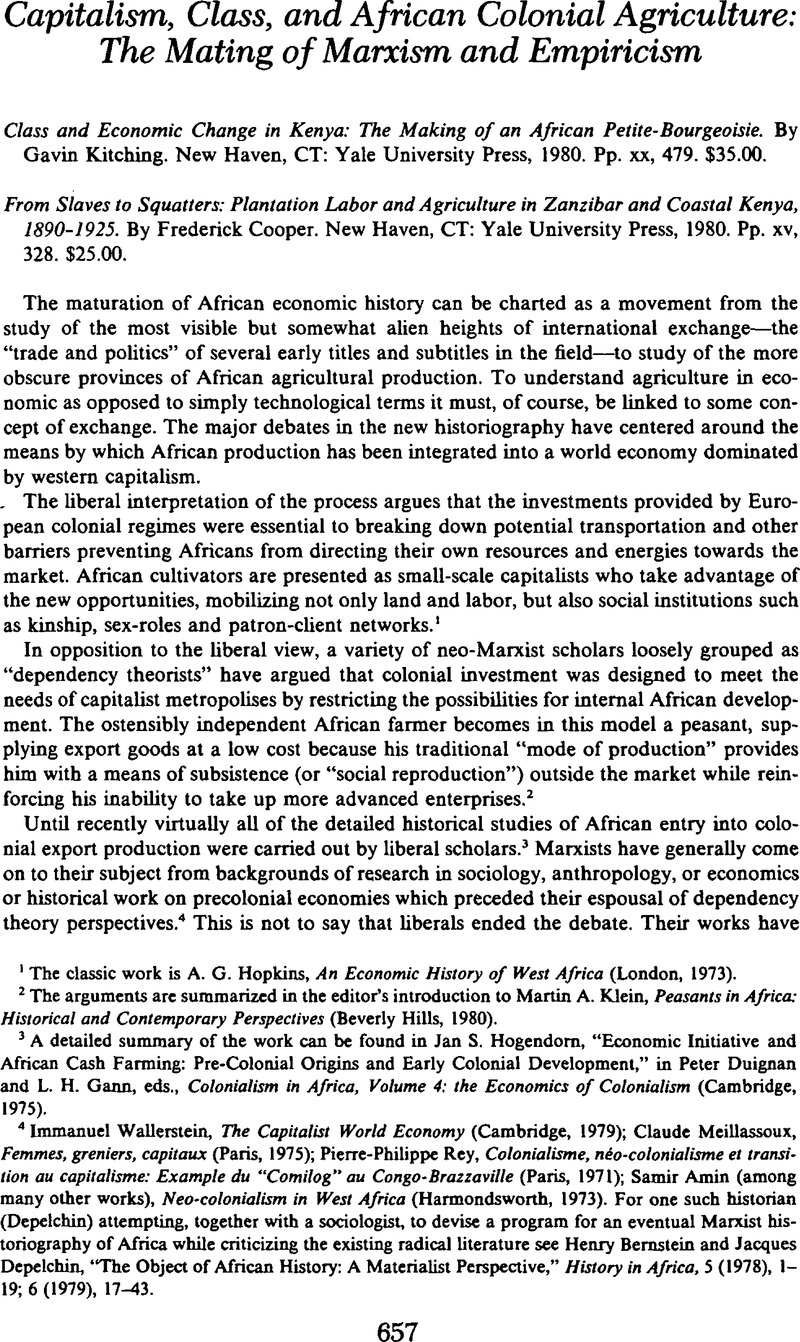Article contents
Capitalism, Class, and African Colonial Agriculture: The Mating of Marxism and Empiricism
Published online by Cambridge University Press: 03 March 2009
Abstract

- Type
- Review Article
- Information
- Copyright
- Copyright © The Economic History Association 1981
References
1 The classic work is Hopkins, A. G., An Economic History of West Africa (London, 1973).Google Scholar
2 The arguments are summarized in the editor's introduction to Klein, Martin A., Peasants in Africa: Historical and Contemporary Perspectives (Beverly Hills, 1980).Google Scholar
3 A detailed summary of the work can be found in Hogendorn, Jan S., “Economic Initiative and African Cash Farming: Pre-Colonial Origins and Early Colonial Development,” in Duignan, Peter and Gann, L. H. eds., Colonialism in Africa, Volume 4: the Economics of Colonialism (Cambridge, 1975).Google Scholar
4 Wallerstein, Immanuel, The Capitalist World Economy (Cambridge, 1979);Google ScholarMeillassoux, Claude, Femmes, greniers, capitaux (Paris, 1975);Google ScholarRey, Pierre-Philippe, Colonialisme, néo-colonialisme et transition au capitalisme: Example du “Comilog” au Congo-Brazzaville (Paris, 1971);Google ScholarAmin, Samir (among many other works), Neo-colonialism in West Africa (Harmondsworth, 1973). For one such historian (Depelchin) attempting, together with a sociologist, to devise a program for an eventual Marxist historiography of Africa while criticizing the existing radical literature seeGoogle ScholarBernstein, Henry and Depelchin, Jacques, “The Object of African History: A Materialist Perspective,” History in Africa, 5 (1978), 1–19; 6 (1979), 17–43.CrossRefGoogle Scholar
5 This is very much the problem with Hopkins and Hogendorn; Berry, Sara in Cocoa, Custom and Socio-Economic Change in Rural Western Nigeria (Oxford, 1975) as well as her more recent unpublished research has taken into account the problems of sustained rural development and also challenged some of the assumptions concerning the exploitation of farmers by urban economic centers.Google Scholar
6 The principal organ for the discussion is the Journal of Southern African Studies which is dominated by Marxist perspectives; but see Kantor, B. S. and Kency, H. F., “The Poverty of Neo-Marxism,” JSAS, 3 (10 1976), 20–40 andGoogle Scholarreply by Wolpe, Harold, JSAS, 4 (04 1977), 240–56.Google Scholar
7 For an overview of this literature and some seminal examples see the editors' introduction and various monographic contributions to Palmer, Robin and Parsons, Neil, The Roots of Rural Poverty in Southern and Central Africa (London, 1977).Google Scholar
8 This optimism is criticized in an excellent review essay on Palmer and Parsons, Ranger, Terence, “Growing from the Roots: Reflections on Peasant Research in Southern and Central Africa,” Journal of Southern African Studies, 5 (10 1978), 99–133;CrossRefGoogle Scholarfor a case study of an autonomous Southern African rural capitalism which appears to have stagnated see Comaroff, John L., “Class and Culture in a Peasant Economy: the Transformation of Land Tenure in Barolong,” in Werbner, R. P., Land Reform and Labor Mobility (London, 1981).Google Scholar
9 Most of the essays in the Klein volume focus on peasant-dominated West African economies. But with the partial exception of Jean-Pierre Chauveau's contribution on the Baule of Ivory Coast (a case which could benefit from the kind of understanding Kitching brings to his material for the same reasons that Kenya and the Ivory Coast are often seen as similar economies) they do not effectively link a Marxist approach with detailed studies of African agriculture. The major Marxist work on Uganda, Mamdani, Mahmood, Politics and Class Formation in Uganda (n. p., 1976), is suggestive but overly schematic. On Tanzania, the efforts of the postcolonial government to impose a form of rural socialism have inspired numerous Marxist critiques based on contemporary data, but the only work to take a historical perspective isGoogle ScholarHyden, Goren, Beyond Ujamaa in Tanzania: Underdevelopment and an Uncaptured Peasantry (Berkeley, 1980) which lapses into somewhat confused theory and policy concerns.Google Scholar
10 Cooper, From Slaves to Squatters, pp. 13–18;Google Scholaralso see Cooper's, essay on Southern African agricultural studies, “Peasants, Capitalists and Historians: a Review Article,” in Journal of Southern African Studies, 7 (04 1981), 284–314.CrossRefGoogle Scholar
11 Leo, Christopher, “The Failure of the ‘Progressive Farmer’ in Kenya's Million Acre Settlement Scheme,” Journal of Modern African Studies, 16, 4(1978), 619–38; see also Comaroff, “Class and Culture.”CrossRefGoogle Scholar
12 Lonsdale, John and Berman, Bruce, “Coping with Contradictions: The Development of the Colonial State in Kenya,” Journal of African History, 20 (1979), 487–506. In contrast, Kitching's only empirical interest in the state seems to be its share in the national wage bill and the implicit impact of such distribution of wealth upon investment. See the comments on Cooper's fuller treatment of official colonial politics below.CrossRefGoogle ScholarLeys, Colin, “Capital Accumulation, Class Formation and Dependency— the Significance of the Kenyan Case,” The Socialist Register, 1978 (Leys relies heavily upon the unpublished rural research of M. P. Cowen, who is also acknowledged as a major source by Kitching);Google ScholarSwainson, Nicole, The Development of Corporate Capitalism in Kenya, 1918–1977 (Berkeley, 1980).Google Scholar
13 Cooper, Frederick, Plantation Slavery on the East Coast of Africa (New Haven, 1977).Google Scholar
14 Cooper, From Slaves to Squatters, pp. 231–32;Google Scholarthis section is largely based on Parkin, David, Palms, Wine and Witnesses (London, 1972).Google Scholar
15 The constructs dominate the works of Karl Polanyi; Scott, James C., The Moral Economy of the Peasant: Rebellion and Subsistence in Southeast Asia (New Haven, 1976);Google ScholarHyden, Beyond Ujamaa, Meillassoux, Femmes, greniers, capitaux.Google Scholar
- 1
- Cited by




